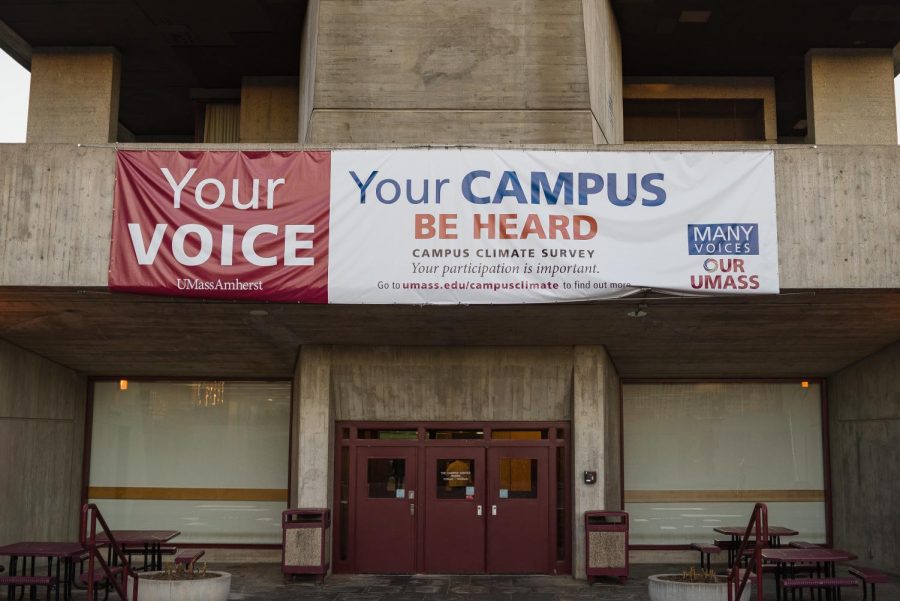Since its inception in 2017, Campus Climate Improvement Grants have helped honor the unseen labor of service workers on campus, host the “We Are For Freedoms” art exhibit and develop 3D-printed models to make STEM content widely accessible.
Every year, students, staff and faculty can submit project proposals that seek to address the climate and community of the University of Massachusetts. The grants can range from $250 and $2500 and can be meant for a single semester or whole-year project.
Grants from the past year include a disability speaker series, a UMass chapter of Society for Advancement of Chicanos and Native Americans in Science and an LGBTQIA+ mentor program. The Campus Climate Improvement Grants are the brainchild of the Office of Equity and Inclusion that created the program based on data collected from the 2016 climate survey and the 2018 campus strategic plan.
“What we wanted to do was give an opportunity for people to identify and thoughtfully address some areas…to bring people together or a way to change the way that people experience campus,” Emmanuel Adero, deputy chief officer for equity and inclusion, said. “I say thoughtfully address, not solve, because if it was that easy, then why didn’t we do that?”
A grant to change the classroom climate
Tyler Bradley, residence director of Baker, Chadbourne and Greenough Halls, discovered the grant program by chance and knew that it could be a helpful resource for Spectrum, the residential community for LGBTQIA+ students.
Responses collected during the 2016 Climate Survey and displayed in a 2018 report noted that the greatest number of negative experiences had by queer and trans students occurred in the classroom.
It reports that 68 percent of trans or genderqueer students were feeling sometimes or often excluded in class based on their social identity (Figure 11). The same study found that 26 percent of trans or genderqueer students reported feeling that they were sometimes or often unjustly singled out because of their social identity (Figure 12).
“We got to talking about how a lot of students don’t know different queer faculty and staff,” Bradley said.
He wanted to show, “there are affirming spaces that happen in the classroom, because we have so many out faculty and staff members.” Bradley outlined a mentor program for students to connect with queer faculty and was approved for a Climate Grant.
The program paired 19 mentors with a little more than 19 students. Some met on a regular basis, some only in the beginning of the semester. The funding helped them host training, roundtable discussions for mentor feedback and to organize activities.
Bradley is expanding the program to include mentor-led workshops, crafts, networking lunch events and immersive experiences like a queer-themed guided tour of the Museum of Fine Arts and a visit to the Wicked Queer Film Festival.
There are, “students out there who are looking for a queer, trans mentor. Passing along that intergenerational knowledge and expertise is really important,” Bradley said. “Even just seeing yourself in these other roles … that adds a lot of power and value.”
What does it take to receive a grant?
The office seeks applications that can clearly identify how they will have a measurable and long-lasting impact. The proposals are reviewed by a team representing each of the major groups on campus: undergraduates, graduate students, staff and faculty.
Applicants who aren’t normally engaged with issues of equity and inclusive environments are favored. “A lot of the grants you’ll see are things that it’s not people’s day jobs, but they’re making connections and building across in ways they would not normally do,” Adero said.
Supportive environment to develop grant-writing skills
Adero provides support throughout the process, often connecting recipients with campus groups or administrators that can address specific needs.
“They often start from, ‘here’s the impact I want to have, but you have to work backwards. And that’s the piece a lot of people don’t necessarily have which grant writing requires.”
Adero previously worked within the nonprofit sector, where many initiatives solely rely on grant funding. A byproduct of the grant program is that it allows students to develop skills for strategic proposals, define measurement standards and practice grant writing in a supported environment.
“I’m very familiar with the importance of grants. I also knew that students, in particular, do not have the opportunity to write grants, ever,” Adero said. “And a lot of [them] are going to go off and do jobs where you might find you need to.”
The first semester, there were more than 40 applications. Pandemic-related advertising and networking issues reduced applications; the office now averages 15 applications per cycle, according to Adero.
There were, “fewer undergrad [applicants] than I would’ve liked … not nearly as many as we used to,” Adero said, adding that his office is seeking to increase engagement with students by expanding their outreach strategies.
The application for grant proposals for the upcoming academic year will be accepted from March 1 through March 17.
“The administration cannot transform the climate for the whole campus. And you don’t want to be in a campus where the administration can do that. And I don’t want to be a part of that either. That’s a dictatorship.”
Grace Fiori can be reached at [email protected] and followed on Twitter @grace_fiori.




















